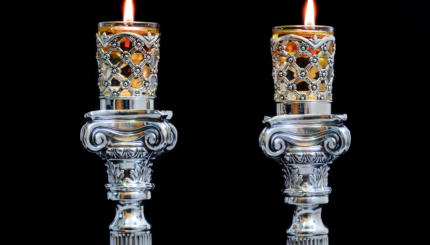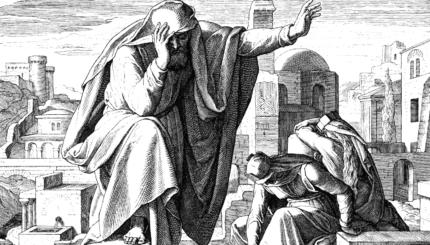How can we understand Matan , the giving of the Torah at Sinai? There are as many answers as there are denominations. As a denominational question, Sinai is an issue of authority and chronology. Does truth come only from God, or can it also come from the community or a principled individual? Does God’s ultimate revelation of truth take place each and every day, or did God deliver one authoritative message long ago?
The denomination question examines the thought behind our actions. It asks why we do what we do. This level of “why” gives access to the real meaning of denominational difference, and takes us right back to that fateful encounter at Sinai.
God Changed Her Mind
What does Sinai look like for Reform Jews? For Reform Judaism, “Sinai” takes place every time a Jew makes a serious and conscientious choice. Reform Judaism’s Centenary Platform, adopted in San Francisco (1976), makes this simple and clear statement of Reform theology: “Jewish obligation begins with the informed will of every individual.” The individual might consider all the dicta of Jewish tradition that has come before her, but in the moment of deciding whether to order tuna or bacon for lunch, the choice is still hers and hers alone. That moment of individual conscience, regardless of outcome, is sacred to Reform Judaism.
A Reform colleague of mine once described her conviction that rabbis should ritually sanctify gay and lesbian relationships by saying: “I know what it says in the Torah (about homosexuality). But that’s not binding. God changed Her mind.” My colleague’s stance made perfect sense as long as we conceive of Sinai as a re-occurring process, not a fixed encounter. The Reform Movement’s 1937 Columbus Platform suggests that the written Torah is a “depository” of Biblical Israel’s consciousness of God—a record of past revelation—but certainly not the last word in our ongoing dialogue with God. Instead, “revelation is a continuous process, confined to no one group and to no one age.” Indeed, according to Reform Judaism, God can “change Her mind.” As such, Sinai is constantly taking place, and it is the role of the individual to listen closely to what God is saying.

Help us keep Jewish knowledge accessible to millions of people around the world.
Your donation to My Jewish Learning fuels endless journeys of Jewish discovery. With your help, My Jewish Learning can continue to provide nonstop opportunities for learning, connection and growth.
The Authority of Sinai
The Orthodox tradition maintains that God taught everything which the Jewish people needed to know at Mount Sinai. This belief draws upon early Rabbinic literature. In Tanhuma (Buber-Ki Tisa 17), the Midrash relates:
“When the Holy-One-Blessed-Be-God came to give Torah, He related it to in order. First Bible, then , Aggadah and Talmud…even those future questions that a seasoned student would one day ask of his teacher. The Holy-One-Blessed-Be-God related even these things to Moshe at that time, as we find in the Torah: And God spoke of all these things…”
This Midrash effectively communicates the most significant aspect of Orthodox thought: God is the only legitimate source of knowledge and truth. No community or individual can take up this role. For the Orthodox Jew, all authority ultimately goes back to God and Sinai.
This belief infuses even the most modern strains of Orthodoxy. Rabbi Samson Raphael Hirsch, the founder of modern orthodoxy, allowed for Jewish involvement in secular life and insisted on the need for secular education, but nonetheless maintained that the Torah, as the sum of God’s will, is not subject to rational argumentation or proof. Similarly, Rabbi Norman Lamm, chancellor of the modern orthodox Yeshiva University, put forth in an article in Commentary magazine that God most certainly had the ability to communicate whatever He wanted to convey at Mount Sinai, and that it would be absurd to “impose upon (God) a limitation of dumbness that would insult the least of His human creatures.”
Perhaps the most interesting contemporary manifestation of the Orthodox notion that all truth comes from Sinai is the idea of Daas Torah (literally “Torah knowledge”). This notion, somewhat contested within Orthodoxy itself, suggests that the Torah is a reliable source of answers to every question, no matter how mundane. Behind this practice is a clear belief that God’s revelation at Sinai must have been all encompassing, addressing all individual situations and particular needs for all times.
A Community Encounter
While mainstream Conservative Jews envision a personal God most Conservative rabbis do not believe that God actually gave the Torah, letter by letter, at Mount Sinai. So what did happen? Rabbi Abraham Joshua Heschel, in his God in Search of Man, argues that the chronological details of Sinai are irrelevant—since the Torah is a moral, not a chronological text. Rabbi Neil Gillman, in Sacred Fragments, argues from Franz Rosenzweig’s position that God merely revealed Himself at Sinai—the people of Israel then recorded their response to God’s presence in the form of Torah. While God might have initiated the revelation at Sinai, it was the human community which preserved that encounter.
Solomon Schechter (1847-1915) summed up this position in the doctrine of “catholic Israel.” The phrase implies that it is the “catholic” or unified body of the people of Israel who are responsible for the development of Judaism in each generation, taking the fruits of the Sinai revelation and adapting them to meet the needs of the day. One Talmudic source illustrates the problem aptly. In the Mishnah (Brachot 6:8), there is a disagreement about what blessing to say when drinking water. The earlier Sages had the tradition that one should say the blessing “over all things…” while Rabbi Tarfon received the tradition to thank “the Creator of many appetites…” before drinking. What was the Law? In the Talmud, the latter Sages refused to resolve the matter. Instead, they decided to “go out and see what the general populous does.” (Brachot 45a)
From this approach, Schechter concluded that the general community should be viewed as the true arbiter of God’s Law. In theological terms, this means that Sinai takes place in the meeting of community—not the lone grappling of individual conscience. Like Reform, Conservative Jews are open to the idea of change as an authentic manifestation of Torah—but only when that change filters through convictions of community. For Conservative Jews, Sinai happens in the public square, as community members seek to understand God.
Sinai Never Was
As the Conservative position disputes the historicity of the Sinai revelation, so the Reconstructionist stance disavows its divinity—but not its sanctity. Founder Mordechai Kaplan’s program for the reconstruction of Judaism rejected the notion of a supernatural God. For him, God was not heavenly being but rather “…the process [in the world] that makes for creativity, integration, love and justice.” This stance, by definition, denies the possibility of a Sinai, an event which Kaplan regarded as a mere legend. After all, if there is no personal God, then what’s to reveal?
Kaplan identifies the content of Torah as a set of “folk-ways” that the people of Israel constructed and continuously adapted to fit the spirit of their age. The tradition would always have “a voice, but not a veto,” as the entire body of tradition was always meant to be in flux. For Kaplan, there could never be a Sinai—instead, the folk-ways of each new generation would reflect the current needs of the Jewish soul. Each new tradition would be sacred—until its time had passed.
Interpreting With Integrity
In the end, I am thankful that each of the movements has invested such energy in grappling with God and Torah. An early Midrash, the Mechilta, expresses my thoughts best: “What great praise it is for Israel, that as soon as they heard God’s word at Sinai, they began to interpret it…” Our interpretations take us in many different directions, but as long as we continue the arduous work of engaging God’s word with integrity, we should profit from the encounter.


